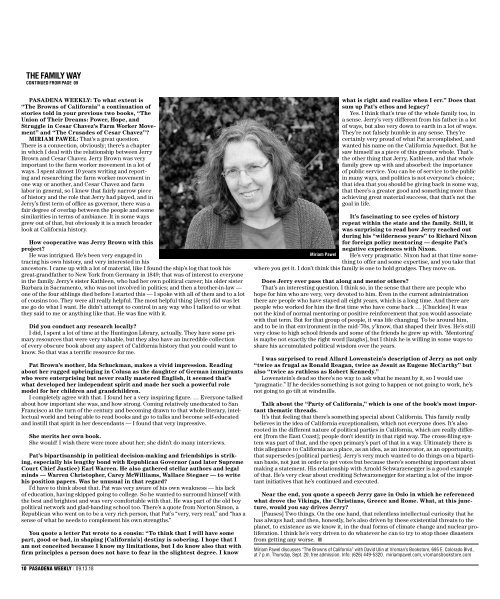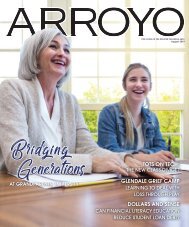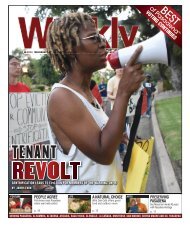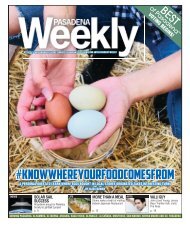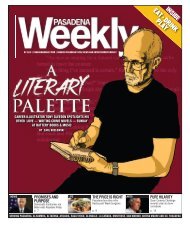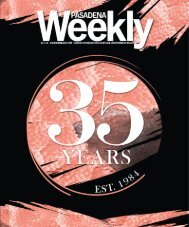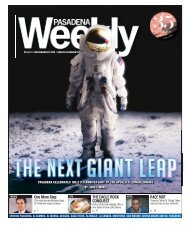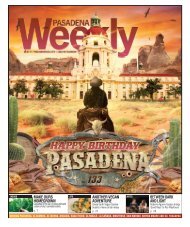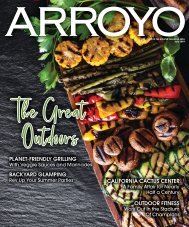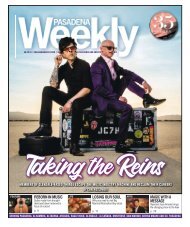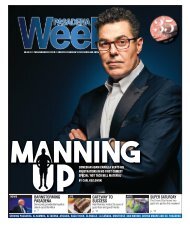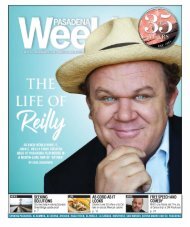09.13.18
Create successful ePaper yourself
Turn your PDF publications into a flip-book with our unique Google optimized e-Paper software.
THE FAMILY WAY<br />
CONTINUED FROM PAGE 09<br />
PASADENA WEEKLY: To what extent is<br />
“The Browns of California” a continuation of<br />
stories told in your previous two books, “The<br />
Union of Their Dreams: Power, Hope, and<br />
Struggle in Cesar Chavez’s Farm Worker Movement”<br />
and “The Crusades of Cesar Chavez”?<br />
MIRIAM PAWEL: That’s a great question.<br />
There is a connection, obviously; there’s a chapter<br />
in which I deal with the relationship between Jerry<br />
Brown and Cesar Chavez. Jerry Brown was very<br />
important to the farm worker movement in a lot of<br />
ways. I spent almost 10 years writing and reporting<br />
and researching the farm worker movement in<br />
one way or another, and Cesar Chavez and farm<br />
labor in general, so I knew that fairly narrow piece<br />
of history and the role that Jerry had played, and in<br />
Jerry’s first term of office as governor, there was a<br />
fair degree of overlap between the people and some<br />
similarities in terms of ambiance. It in some ways<br />
grew out of that, but obviously it is a much broader<br />
look at California history.<br />
How cooperative was Jerry Brown with this<br />
project?<br />
He was intrigued. He’s been very engaged in<br />
tracing his own history, and very interested in his<br />
ancestors. I came up with a lot of material, like I found the ship’s log that took his<br />
great-grandfather to New York from Germany in 1849; that was of interest to everyone<br />
in the family. Jerry’s sister Kathleen, who had her own political career; his older sister<br />
Barbara in Sacramento, who was not involved in politics; and then a brother-in-law —<br />
one of the four siblings died before I started this — I spoke with all of them and to a lot<br />
of cousins too. They were all really helpful. The most helpful thing [Jerry] did was let<br />
me go do what I want. He didn’t attempt to control in any way who I talked to or what<br />
they said to me or anything like that. He was fine with it.<br />
Did you conduct any research locally?<br />
I did, I spent a lot of time at the Huntingon Library, actually. They have some primary<br />
resources that were very valuable, but they also have an incredible collection<br />
of every obscure book about any aspect of California history that you could want to<br />
know. So that was a terrific resource for me.<br />
Pat Brown’s mother, Ida Schuckman, makes a vivid impression. Reading<br />
about her rugged upbringing in Colusa as the daughter of German immigrants<br />
who were enterprising but never really mastered English, it seemed that’s<br />
what developed her independent spirit and made her such a powerful role<br />
model for her children and grandchildren.<br />
I completely agree with that. I found her a very inspiring figure. … Everyone talked<br />
about how important she was, and how strong. Coming relatively uneducated to San<br />
Francisco at the turn of the century and becoming drawn to that whole literary, intellectual<br />
world and being able to read books and go to talks and become self-educated<br />
and instill that spirit in her descendants — I found that very impressive.<br />
She merits her own book.<br />
She would! I wish there were more about her; she didn’t do many interviews.<br />
Pat’s bipartisanship in political decision-making and friendships is striking,<br />
especially his lengthy bond with Republican Governor (and later Supreme<br />
Court Chief Justice) Earl Warren. He also gathered stellar authors and legal<br />
minds — Warren Christopher, Carey McWilliams, Wallace Stegner — to write<br />
his position papers. Was he unusual in that regard?<br />
I’d have to think about that. Pat was very aware of his own weakness — his lack<br />
of education, having skipped going to college. So he wanted to surround himself with<br />
the best and brightest and was very comfortable with that. He was part of the old boy<br />
political network and glad-handing school too. There’s a quote from Norton Simon, a<br />
Republican who went on to be a very rich person, that Pat’s “very, very real,” and “has a<br />
sense of what he needs to complement his own strengths.”<br />
You quote a letter Pat wrote to a cousin: “To think that I will have some<br />
part, good or bad, in shaping [California’s] destiny is sobering. I hope that I<br />
am not conceited because I know my limitations, but I do know also that with<br />
firm principles a person does not have to fear in the slightest degree. I know<br />
what is right and realize when I err.” Does that<br />
sum up Pat’s ethos and legacy?<br />
Yes. I think that’s true of the whole family too, in<br />
a sense. Jerry’s very different from his father in a lot<br />
of ways, but also very down to earth in a lot of ways.<br />
They’re not falsely humble in any sense. They’re<br />
certainly very proud of what Pat accomplished, and<br />
wanted his name on the California Aqueduct. But he<br />
saw himself as a piece of this greater whole. That’s<br />
the other thing that Jerry, Kathleen, and that whole<br />
family grew up with and absorbed: the importance<br />
of public service. You can be of service to the public<br />
in many ways, and politics is not everyone’s choice;<br />
that idea that you should be giving back in some way,<br />
that there’s a greater good and something more than<br />
achieving great material success, that that’s not the<br />
goal in life.<br />
It’s fascinating to see cycles of history<br />
repeat within the state and the family. Still, it<br />
was surprising to read how Jerry reached out<br />
during his “wilderness years” to Richard Nixon<br />
for foreign policy mentoring — despite Pat’s<br />
negative experiences with Nixon.<br />
Miriam Pawel He’s very pragmatic. Nixon had at that time something<br />
to offer and some expertise, and you take that<br />
where you get it. I don’t think this family is one to hold grudges. They move on.<br />
Does Jerry ever pass that along and mentor others?<br />
That’s an interesting question. I think so, in the sense that there are people who<br />
hope for him who are very, very devoted to him. Even in the current administration<br />
there are people who have stayed all eight years, which is a long time. And there are<br />
people who worked for him the first time who have come back … [Chuckles] It was<br />
not the kind of normal mentoring or positive reinforcement that you would associate<br />
with that term. But for that group of people, it was life changing. To be around him,<br />
and to be in that environment in the mid-’70s, y’know, that shaped their lives. He’s still<br />
very close to high school friends and some of the friends he grew up with. ‘Mentoring’<br />
is maybe not exactly the right word [laughs], but I think he is willing in some ways to<br />
share his accumulated political wisdom over the years.<br />
I was surprised to read Allard Lowenstein’s description of Jerry as not only<br />
“twice as frugal as Ronald Reagan, twice as Jesuit as Eugene McCarthy” but<br />
also “twice as ruthless as Robert Kennedy.”<br />
Lowenstein’s dead so there’s no way to ask what he meant by it, so I would use<br />
“pragmatic.” If he decides something is not going to happen or not going to work, he’s<br />
not going to go tilt at windmills.<br />
Talk about the “Party of California,” which is one of the book’s most important<br />
thematic threads.<br />
It’s that feeling that there’s something special about California. This family really<br />
believes in the idea of California exceptionalism, which not everyone does. It’s also<br />
rooted in the different nature of political parties in California, which are really different<br />
[from the East Coast]; people don’t identify in that rigid way. The cross-filing system<br />
was part of that, and the open primary’s part of that in a way. Ultimately there is<br />
this allegiance to California as a place, as an idea, as an innovator, as an opportunity,<br />
that supersedes [political parties]. Jerry’s very much wanted to do things on a bipartisan<br />
basis, not just in order to get votes but because there’s something important about<br />
making a statement. His relationship with Arnold Schwarzenegger is a good example<br />
of that. He’s very clear about crediting Schwarzenegger for starting a lot of the important<br />
initiatives that he’s continued and executed.<br />
Near the end, you quote a speech Jerry gave in Oslo in which he referenced<br />
what drove the Vikings, the Christians, Greece and Rome. What, at this juncture,<br />
would you say drives Jerry?<br />
[Pauses] Two things. On the one hand, that relentless intellectual curiosity that he<br />
has always had; and then, honestly, he’s also driven by these existential threats to the<br />
planet, to existence as we know it, in the dual forms of climate change and nuclear proliferation.<br />
I think he’s very driven to do whatever he can to try to stop those disasters<br />
from getting any worse. n<br />
Miriam Pawel discusses “The Browns of California” with David Ulin at Vroman’s Bookstore, 695 E. Colorado Blvd.,<br />
at 7 p.m. Thursday, Sept. 20; free admission. Info: (626) 449-5320. miriampawel.com, vromansbookstore.com<br />
10 PASADENA WEEKLY | <strong>09.13.18</strong>


